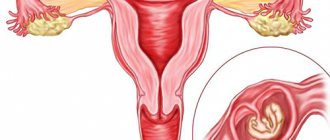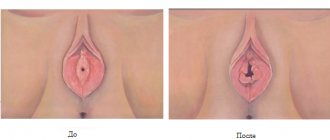Author's rating
5
Author of the article
Daria Polevaya
Practicing general practitioner with 7 years of experience. I love my job and try to constantly improve my skills.
Articles written
20
Abortion has serious consequences for the reproductive system and for the female body as a whole. This affects the menstrual cycle. How many days after an abortion does my period begin? The answer to this question depends on the characteristics of the body and on the type of abortion: medical, surgical or vacuum.
Features of menstruation with various types of abortion
An abortion is an operation to terminate an unplanned pregnancy, after which the woman’s body undergoes severe shocks. Your periods depend on the complexity and type of surgery performed: their duration, intensity and pain.
There are such abortions: medical, vacuum and surgical; the choice of one or the other depends on the stage of pregnancy, the woman’s health condition and medical indicators. Each of the listed types has its own characteristics and consequences; we will consider them separately.
Medical abortion
A medical or pharmaceutical abortion is an artificial termination of pregnancy that does not require surgery. The girl takes special medications containing mifeprestone, which affect the fetus and cause it to be rejected and released naturally. All this is accompanied by bleeding, which lasts for ten days. It must be remembered that such an operation can only be performed for up to seven weeks, otherwise fetal rejection will not occur.
Usually, in the absence of any complications, menstruation after the abortion in question begins quickly - after 20-35 days, depending on the characteristics of the body. As soon as the bleeding is completed (about 10 days), the miscarriage is considered to have occurred, menstruation should begin on time, and the beginning of the cycle is considered the day of taking the coveted pill. A delay of one to one and a half weeks is normal, the body begins to function as before, and for this it may need a little more time. The intensity of the discharge should be the same as before the abortion, but sometimes it can be more abundant. If the delay is long, menstruation does not occur for forty days or more, and everything is accompanied by fever, dizziness, nausea and cramping pain in the lower abdomen - immediately go to the gynecologist.
Be sure to do an ultrasound to confirm the medical abortion; unfortunately, such an interruption does not guarantee a 100% result; if the fact of pregnancy is confirmed, bearing a child is strictly prohibited, and there is a huge risk of various serious pathologies.
Contraindications to medical abortion
Medical termination of pregnancy is carried out at the request of the woman or in the case when there is a medical ban on childbirth in the near future, and fertilization of the egg has occurred. In such a situation, it is better to terminate a short-term pregnancy using a medical abortion, rather than a conventional abortion with curettage.
An ectopic pregnancy cannot be removed with pills; it can only be removed during surgery.
Before medical termination of pregnancy, it is necessary to do an ultrasound to determine the location of the fertilized egg. If it is fixed in the ovary, fallopian tube or peritoneum, the doctor will prohibit you from doing a pharmabortion.
Other contraindications to medical abortion:
- Allergy to components of the abortifacient drug.
- Long-term use of glucocorticosteroids.
- Kidney and liver failure.
- Inflammatory diseases of the reproductive system.
- Severe gynecological pathologies.
- Myoma and malignant changes of the uterus.
- Period of treatment with anticoagulants.
- Disturbances in the blood coagulation system.
If a woman smokes and is over 35 years of age, the doctor may refuse to perform a pill abortion.
PS Remember that a medical abortion puts the body into shock. Many organs and systems undergo changes, and the woman herself reacts to this event with increased fatigue and psychological disorders.
If the patient’s health condition cannot be considered excellent, after pharmaabortion she may have infectious and inflammatory diseases of the internal genitalia or long-term delays in menstruation.
Vacuum abortion
Pulling out the fertilized egg through a special catheter using a device that reduces pressure inside the uterus is called a vacuum or mini-abortion. Vacuum suction is convenient because it does not require additional expansion; the catheter is inserted through the cervix, this reduces the risk of injury, infection or bleeding.
This termination of pregnancy is carried out at five to six weeks. It is not recommended to do this after the seventh week; there is a risk of incomplete removal of the fertilized egg, and in the early stages it may simply not be pulled out by the catheter. This procedure usually lasts ten to fifteen minutes and is performed under local anesthesia.
After vacuum aspiration for ten days, a woman may experience mild mucous-blood discharge caused by minor damage to the uterus. Healthy periods, as a rule, begin after thirty to forty days; their intensity should be similar to the discharge before pregnancy, sometimes becoming more or less heavy. Remember, complete restoration of menstruation takes three or even four months. If the bleeding is severe, with a strong unpleasant odor, accompanied by pain in the lower abdomen, this indicates that not all of the fetus was removed and an abortion will have to be performed again. This procedure can cause changes in hormonal levels and the maturation of follicles.
After the operation, it is necessary to be observed by a specialist, and after one and a half to two weeks an ultrasound is performed to make sure that everything was successful and repeated intervention is not required. Usually the doctor prescribes medications to eliminate the possibility of inflammation and other consequences.
Surgical abortion
This is the most reliable, but also the most dangerous type of abortion. Surgical termination of pregnancy is characterized as such because the doctor, using special medical instruments, expands the cervical canal and scrapes out the embryo. This operation is performed under general anesthesia. The deadline for instrumental termination is 20 weeks, after which there is a risk of incomplete removal of the fetus and life-threatening complications.
Causes of scanty discharge after pharmaabortion
Termination of pregnancy with Mirolute is carried out in the early stages, when the endometrium has not yet had time to grow significantly and the embryo has not yet firmly attached to the uterine wall. Scanty bleeding after mirolut may be normal. However, it happens that the reason for such periods after medical termination of pregnancy is hidden in the following:
- significant hormonal changes, in which the menstrual cycle is restored only after a few months;
- mechanical obstruction to the outflow of blood through the vagina (tightly closed cervix, blood clot above the vaginal opening).
The latter reason poses a serious threat to a woman’s life and the ability to bear a child in the future. Surgery may be necessary to correct this complication. In addition, there is a possibility that the pregnancy has continued.
Menstruation after abortion
“How many days after an abortion do you get your period?” - a question that concerns all women who have encountered this unpleasant procedure, because the onset of menstruation indicates that the patient is recovering. Moderate, painless discharge a month after surgery is considered normal, but women often experience unstable periods. The main reason for such menstruation is damage to the uterine cavity due to the removal of the fetus. Such damage provokes the formation of adhesions and scars, as a result of which the endometrium grows unevenly, and menstruation is scanty or too abundant. Within several months (from three to six), periods should become regular and not exceed seven days (the norm before pregnancy), but if the discharge is pathological, you should consult a doctor.
Let's take a closer look at the types of discharge after artificial termination of pregnancy:
- Abundant. Such periods signal that due to surgical intervention a hormonal imbalance has occurred in the body or the fetus has not been completely removed and a repeat operation is required. Intense discharge affects the general condition of a woman; due to severe blood loss, immunity decreases, iron and hemoglobin deficiency, chronic fatigue, and apathy develop. Why do my periods take so long after an abortion? If the bleeding does not stop (lasts longer than ten days), is accompanied by pain in the lower abdomen, fever, you need to consult a doctor; perhaps the operation was performed poorly: the uterus was damaged in the process, or the fertilized egg was not completely removed.
- Scarce. Such periods, unlike heavy ones, after an abortion are considered typical; they signal that the uterus has not yet recovered, the endometrium has not grown properly, and more time is needed. But if the scanty discharge has an unpleasant, pungent odor, you need to make an appointment with a gynecologist, because... these may be symptoms of a uterine infection.
- Delayed menstruation , 2 months have passed since the abortion? Menstruation is considered normal if it begins after a period of time corresponding to the cycle before pregnancy. But sometimes a month passes, then another, and the critical days still don’t come. Why are there no periods after an interruption? To answer this question, you need to find out the reason for the lack of menstruation. This may be a consequence of a hormonal imbalance in the body caused by an abortion, the result of damage to the uterine epithelium, a medical error, or the result of shock and depression, which reduce the level of estrogen, which is responsible for the onset of menstruation. Also, there are no critical days due to various gynecological diseases, pathologies, inflammation, cysts, and uterine fibroids.
Due to mechanical damage, the endometrium recovers more slowly, so menstruation begins 35-40 days after termination of pregnancy, over time this period will shorten to the usual 28-30 days. If they are absent longer, it is necessary to consult a specialist; this signals that adhesions, cysts, or, less commonly, a tumor may have formed at the site of the intervention and, as a result, the woman is diagnosed with infertility.
It happens that ovulation occurs 10-14 days after surgery. Some, without adhering to the doctor’s instructions, begin to be sexually active immediately after the intervention, which leads to a delay and a new unwanted pregnancy.
Signs of pathology
We have answered in detail the question of how many days after an abortion the first menstruation should begin, as well as what is their normal duration. However, this applies to those cases if the woman is fine with her health. Sometimes such operations can end unsuccessfully. If menstruation began a little earlier or after an abortion your period does not come, then you need to seek help from a clinic. It is likely that the woman is developing some kind of pathology. Most often, such pathologies include those described below.
How not to confuse menstruation and post-abortion discharge
Typically, the critical days after the removal of the fetus begin 28-35 days later, while post-abortion discharge occurs on the first day after termination of pregnancy and lasts about a week and a half. Outwardly, such bleeding is very similar to regular menstruation: first, scanty brown discharge in the form of mucus with blood clots, then copious amounts of blood, at this time the fertilized egg is released, and after approximately seven days the discharge becomes spotting. This state of affairs indicates the absence of pathologies and complications.
First menstruation after abortion
If no problems arise immediately after curettage, then the condition in most women returns to normal within 4-5 weeks. But the discharge in nature and intensity in the first menstruation after abortive curettage may differ. The reason for the change in their character is a sharp hormonal change. If the condition does not return to normal within 3 months, then you need to work with your gynecologist to find out the causes of the disorders.
How many days does your period last after an abortion?
If a woman’s body was able to recover quickly, then the duration and nature of her critical days will not change. The duration of the first menstruation after curettage varies from 3 to 7 days.
Consultation with a gynecologist is necessary if menstruation stops 2 days after it started. You should be wary of discharge if it continues for more than 7 days in a row.
Heavy periods after curettage
An increase in the volume of discharge after surgery is observed in 10-12% of patients. Gynecologists say the reason for the occurrence of heavy periods after cleansing is the sharp hormonal changes that the body undergoes.
Important! A woman should know how to distinguish heavy periods from bleeding.
You should call an ambulance or go to the gynecological department of the hospital immediately if the pad is not enough for 1-2 hours.
How many days should menstruation last?
It is impossible to give an exact answer as to how long menstrual bleeding will continue after an abortion, since before pregnancy the number of days of menstruation is different for everyone. Gynecologists say that most often bleeding lasts from 3 to 5 days, but it is quite normal if it lasts longer, up to 10 days. After this period, you should go to the doctor. Don’t be alarmed if your periods are different for the first 3-4 months: the cycle is still recovering, this is not a deviation.
Delayed menstruation after abortion
If the patient has no complications after curettage, vacuum or medical abortion, then her period should come on time. The countdown must be carried out from the day the procedure is performed. A delay of up to 10 days is acceptable. After external intervention or a sudden change in hormonal levels, the body needs time to recover.
In cases where there are no periods after an abortion for 3 months, pregnancy must be excluded. Conception can occur 2 weeks after curettage. If a woman is not pregnant, then it is necessary to check the functioning of the ovaries and other organs that produce female hormones.
Important! Lack of menstruation can be caused by damage to the basal layer.
In such a situation, long-term treatment will be required to normalize the functioning of the uterus.
Restoring a cycle after an abortion
Gynecologists recommend that women who have had an abortion take oral contraceptives for 3-6 months. With the help of tablets, it is possible to prevent the occurrence of a new pregnancy and prevent the occurrence of hormonal imbalance.
The period of restoration of the menstrual cycle is affected by:
- the patient's health status;
- age;
- hormonal disorders that existed before curettage;
- method of abortion;
- gestational age;
- surgeon's professionalism.
You can reduce the likelihood of complications if you follow your doctor’s recommendations and monitor your condition. Many gynecologists recommend that women come for an examination and have an ultrasound 1-1.5 weeks after the abortion. If necessary, the doctor will prescribe medications that promote active contraction of the uterus and growth of the endometrium in phase 2 of the cycle.
How to get your period after an abortion
If, after termination of pregnancy or therapeutic and diagnostic curettage, menstruation does not begin on time, then an examination and consultation with the treating gynecologist is required. It is strictly prohibited to use traditional methods that bring about the arrival of menstruation.
The doctor must determine the reasons for the delay. Depending on the factors that led to the absence of menstruation, therapy is selected. Your doctor may prescribe progesterone medications, which may cause bleeding when discontinued. To normalize hormonal levels after the onset of menstruation, oral contraceptives are selected.
Heavy menstruation
Most women note that after an abortion, periods have become atypical: for example, their intensity has changed. The intensity of menstruation is different for all women, and there is no need to be alarmed if, after termination of pregnancy, the discharge becomes more abundant. But too much discharge should already alert you. If there are not enough hygiene products for more than an hour, then your periods are not normal. Large blood clots may also be a reason to visit a doctor.
Why are heavy periods dangerous? You lose a lot of blood, hemoglobin leaves the body, and with it iron. You may feel weak, tired, and lack of strength. If this is the case, go to the doctor immediately.
After an abortion, periods may last a little longer, but should not be very heavy.
Various pathologies that have a bad effect on regulation
Let's take a closer look at the possible causes of failures.
Hormonal disbalance
The female body is a unique system: during pregnancy, a large number of different hormones are produced that contribute to the favorable bearing of the child. After the abortion procedure, this function is no longer required by the body, and the background changes. And the longer the pregnancy, the higher the risk of failure.
This condition is very dangerous; the woman must be constantly under the supervision of a specialist. At first, due to such an imbalance, there may be a long delay - this is why after an abortion there are no periods for a long time, and over time the following deviations and diseases are observed:
- irregular, constantly changing cycle
- heavy discharge during menstruation
- polycystic disease (formation of many cysts, both in the ovaries and mammary glands)
- myoma
- endometriosis
- adenomyosis
- formation of endometrial polyps
- constant fatigue, apathy
- drowsiness during the day and insomnia at night
- mood swings, irritability
- noticeable weight gain and loss in a short period of time
- severe rashes
- in the absence of proper treatment, adhesions appear
- chronic inflammation
- changes that provoke cancer and infertility
If a girl after an abortion exhibits at least a few of the described signs, then she immediately needs to see a doctor and get tested for hormones. Based on the results obtained, treatment and selection of medications will be based.
Endometrial damage
During a surgical abortion, the endometrium, the inner layer of the uterus, is almost always injured, which subsequently leads to infection. This layer is necessary because... performs an important function - it is rejected and grows during the cycle, which is necessary for conception.
During the operation, the doctor, using special devices, expands the cervix and penetrates the uterus (which can cause infection to enter the body) and uses a curette to scrape out the fetus along with the existing endometrium. This procedure leads to the fact that the uterus becomes like a continuous wound, which is an excellent place for the development of inflammation caused by infections that have entered the body.
After a vacuum abortion, damage to the endometrium is much less common, it depends on the specifics of the abortion procedure - the fertilized egg is removed by vacuum. After medication, such damage is almost never recorded.
Symptoms of endometritis (damage to the endometrium) will not take long to appear. This pathology is accompanied by an increase in temperature to 40°C, purulent discharge mixed with blood, sharp pain in the lower abdomen, weakness, and lack of appetite. If a girl experiences similar symptoms after an abortion, she should immediately consult a doctor.
How to calculate the date of the appearance of menstruation
Menstruation after a vacuum termination of pregnancy, in the absence of obstacles to the course of recovery processes, for example, a urogenital infection, should occur within 2 months.
If the woman is in excellent health and has a high level of immune response, menstruation may begin earlier - within the first month after surgery. Therefore, when answering the question of when menstruation begins after a mini-abortion, one should take into account the individual characteristics of the female body, in particular, the level of immunity and the speed of recovery reactions.
There is a method that allows you to calculate the acceptable time for the appearance of the first menstruation. To do this, you need to know the average duration of a normal menstrual cycle. Let's say it is 27 days. This means that after this time interval has passed after vacuum aspiration, the woman can expect the first vaginal discharge. However, due to the manipulation performed, a delay of 7–10 days is allowed.
Accordingly, using this data we can calculate the approximate date of the onset of menstruation. We count: 27 + 10 = 37 days. If the operation was performed on April 1, then your period may arrive as early as May 7. However, do not forget that doctors allow a recovery period of up to two months. That is, with the specified initial data, menstruation should begin before June 1.
A faster restoration of normal cycle frequency is facilitated by:
- to give up smoking;
- a diet excluding coffee products and chocolate;
- bed rest.
Another important factor influencing the period of recovery of the cycle is the presence of previous births. For a nulliparous woman, the rehabilitation period is much longer.
How is recovery going?
The menstrual cycle may return on its own if the surgery was successful and without complications. In this case, the first period will come after 30 days, including the day of the operation.
If after a month the menstrual cycle has not returned, this indicates complications after the procedure. This condition indicates possible problems and disorders in the body, which requires an immediate visit to a specialist.
Basically, the menstrual cycle recovers quite quickly after surgery and becomes regular, as before pregnancy. In the absence of damage to the uterine cavity, the body will quickly return to normal and all processes of the reproductive system will be restored.
If the menstrual cycle after an abortion is regular, but there is prolonged and heavy discharge, then you should visit a doctor. Such symptoms may indicate postoperative complications.
Regular periods indicate a well-tolerated operation. But also critical days that differ from previous ones may indicate the presence of complications. As a rule, they are accompanied by poor health and general weakness in the body. That is why you should especially carefully monitor the menstrual cycle and pay attention to all uncharacteristic manifestations of menstruation.
In case of any deviations from the norm, you must visit a doctor and undergo an examination. The female body recovers most quickly and, as a rule, without complications, when an abortion is performed at a short stage of pregnancy.
Psychological factor
Recovery after an abortion (surgical, vacuum, pills that cause miscarriage) before the onset of menstruation is a long process. It goes differently for everyone. Therefore, it is difficult to say exactly when periods begin after an abortion. It is important to adhere to all recommendations and prescriptions of a specialist. Not least important is psychological rehabilitation. This does not mean that you need to immediately make an appointment with a psychotherapist. The support of relatives and close people will help greatly in restoring psychological health (so that your loved one does not walk around in a daze), because they know a woman’s character well and can guess her thoughts.
Such support must be given its due, because sometimes it turns out to be the best medicine. To better understand what happens to a woman’s body during this period, relatives can read special articles and comments, stories from the lives of women who went through an abortion. This will help you choose the right words.
Tips and tricks
After an abortion, regardless of whether it was medicinal, vacuum or surgical, the woman should be in a state of calm for the first month: avoid physical activity, heavy lifting, sex, all of which provoke bleeding. You should also avoid eating spicy foods, drinking alcohol, and smoking because they increase blood circulation. Refusal from sexual activity at first is also necessary because now there is a high risk of infection in the uterus. Control your discharge, follow hygiene rules, and avoid tampons, visits to the beach, baths and saunas for now. 7-10 days after the operation, go to see a doctor to exclude the possibility of damage to the endometrium, accumulation of blood in the uterine cavity and make sure that the embryo has been completely removed.
Usually in such situations, hormonal drugs and medications are prescribed for several months, and planning a new pregnancy is not advisable in the first six months.
Abortion is a very serious stress that negatively affects hormonal levels. It is important to restore all processes, so listen carefully to your body, and if there are any suspicious manifestations (abundance) or if there is a long absence of discharge or an unpleasant odor, sharp pain, or increased body temperature, consult a doctor immediately. If post-abortion or menstrual discharge is accompanied by a rotten smell and is green or yellow in color, treatment should be immediate.
Getting infected
Much will depend on what kind of menstruation the woman had after the abortion. A very alarming symptom is an unpleasant odor or unusual consistency. It often happens that menstruation is quite thin, or there are blood clots in it. If the discharge contains yellow clots or bloody impurities, this may indicate the development of an infection. When menstruation is accompanied by unpleasant sensations that were not previously observed, this is also a reason to visit a doctor. These will all be signs of infection. When they make themselves felt, the woman must undergo a course of therapy, otherwise chronic diseases, even infertility, may develop.










